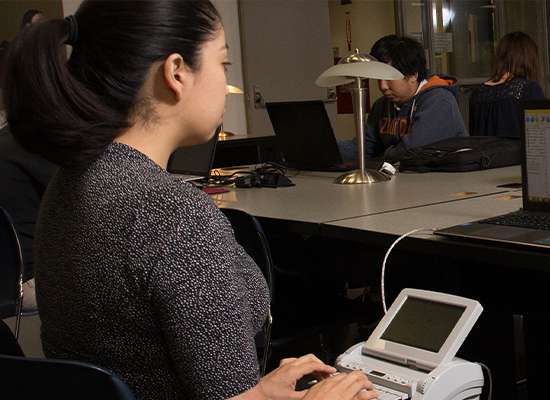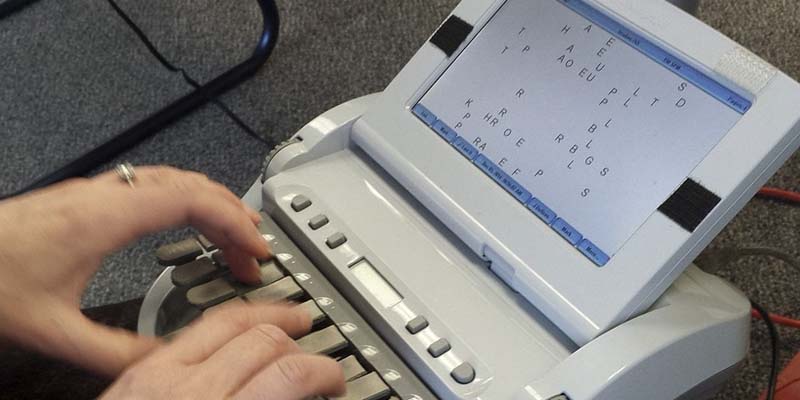The role of durham court reporting in trial preparation
Everything About Court Reporting: Vital Insights Into Its Value in Legislation
Court reporting serves an essential function within the lawful framework, providing a precise and reputable record of proceedings. Via innovative strategies and tools, court press reporters catch the nuances of testimonies and legal discussion. The relevance of their work extends beyond simple transcription. As the lawful landscape advances, so also does the duty of modern technology in court reporting. Comprehending these dynamics reveals much deeper effects for justice and openness in the legal system.
The Duty of Court Reporters in the Legal System

Although commonly overlooked, stenotype reporter play a necessary duty in the lawful system by making certain a verbatim and exact record of procedures. Their main responsibility entails transcribing spoken words during tests, depositions, and various other lawful events, which functions as a main document for future referral. This paperwork is necessary for charms, as it supplies the essential information for examining decisions made by discretionary.
Stenotype reporter must possess remarkable paying attention skills and a deep understanding of legal terms to capture the subtleties of testament and argumentation accurately. Their work adds to transparency within the judicial process, allowing for responsibility and justness. In addition, they help with access to justice by making documents offered to entailed celebrations, ensuring that every person has the chance to review the process. In this way, court press reporters maintain the integrity of the legal system, reinforcing the importance of accurate interaction in issues of regulation.
Methods and Devices Utilized in Court Reporting
In court reporting, different techniques and tools improve the accuracy and effectiveness of transcription. Stenography innovation plays a significant function, allowing reporters to record spoken words rapidly, while digital recording approaches offer alternative solutions for paperwork. Recognizing these tools is important for grasping just how court press reporters satisfy their important feature in the lawful system.
Stenography Modern Technology Overview
Stenography technology offers as the cornerstone of modern court reporting, enabling precise and reliable transcription of spoken dialogue. Utilizing specialized machines called stenographs, stenotype reporter can record speech at impressive rates, frequently exceeding 200 words per min. These devices use a distinct key-board design that allows multiple tricks to be pushed concurrently, developing phonetic representations of words - durham court reporting. This technique decreases the requirement for considerable punctuation and improves transcription precision. Additionally, stenographers make use of different shorthand strategies and symbols to additional streamline the procedure, ensuring that no detail is neglected throughout process. The assimilation of stenography innovation not only cultivates effective communication in legal setups yet additionally upholds the honesty of the judicial process by offering dependable and accurate records of discussions
Digital Recording Approaches
An increasing variety of court reporting professionals are transforming to electronic recording techniques to boost the precision and efficiency of their transcriptions. These techniques use advanced audio and video clip innovation to capture proceedings in real-time. Digital recorders, typically combined with high-quality microphones, guarantee that every word spoken is protected with clarity. Specialized software application can transcribe audio files immediately, permitting for quicker turnaround times. Some professionals integrate double recording systems for redundancy, ensuring no vital information is shed. In enhancement, digital recordings can be easily indexed and searched, promoting quick access of certain sections. As legal atmospheres progress, embracing these electronic tools not just improves the reporting process yet likewise maintains the integrity of the document.
The Significance of Accuracy in Transcription
Precision in transcription is vital in court reporting, as it assures that lawful records show truth content of process. This accuracy can greatly influence instance outcomes, impacting the choices made by courts and courts. Preserving high criteria of accuracy is critical in the lawful career.

Precision in Lawful Records
Although the lawful system relies greatly on significant debates and influential unsupported claims, real backbone of judicial procedures exists in the accuracy of lawful documents. Precise transcription is essential, as it ensures that every declaration, concern, and judgment is recorded appropriately. Such accuracy offers numerous functions, including supplying a dependable reference for appeal procedures and maintaining the honesty of the judicial system. Errors in transcription can bring about misconceptions, false impressions, and possibly detrimental effects for all parties involved. Subsequently, stenotype reporter must have phenomenal abilities and attention to detail, as their job straight influences the clarity of lawful records. Inevitably, the precision of legal records underpins the trust fund placed in the judicial procedure, reinforcing the relevance of meticulous transcription.

Effect On Case Outcomes
When lawful proceedings unfold, the accuracy of transcription typically determines the trajectory of a situation's outcome. Precise court reporting guarantees that every word talked is efficiently captured, making it possible for juries, judges, and lawyers to make educated choices based upon the document. Mistakes in transcription can result in misunderstandings, false impressions, and potentially unjust judgments. The stability of legal documents depends heavily on the precision of these documents, as they serve as the structure see this website for allures and more lawsuits. In high-stakes instances, where the ramifications are extensive, the role of a stenotype reporter comes to be much more vital. For that reason, preserving strenuous criteria in transcription not just supports the legal procedure but likewise upholds the principles of justice and fairness in the court room.
Court Reporting in Various Legal Setups
Court reporting plays an essential duty throughout different lawful settings, ensuring that proceedings are properly documented for future referral. In criminal court, stenotype reporter record testimonies, evidence, and judicial rulings, which are vital for charms and instance reviews. In civil litigation, precise transcripts promote the discovery procedure and supply a reputable record for test procedures. Additionally, administrative hearings often depend on stenotype reporter to keep a main document, guaranteeing openness and accountability in governmental procedures. Family courts also take advantage of court reporting, as accurate documents of proceedings can affect custody choices and negotiations. In addition, depositions in pre-trial stages call for exact recordings to record the nuances of witness statements, which might be significant in forming instance approaches. In general, court reporting serves as a keystone in the legal system, cultivating justness and quality across diverse judicial environments.
The Effect of Modern Technology on Court Reporting
As modern technology remains to develop, its influence on court reporting has actually ended up being increasingly substantial. Innovations such as electronic recording, real-time transcription software, and expert system have changed traditional techniques. Digital audio recorders currently capture courtroom process with impressive clarity, enabling stenotype reporter to concentrate on subtleties and context instead of solely on typing. Real-time transcription technologies enable immediate access to records, promoting efficiency and boosting cooperation amongst lawyers. Additionally, expert system devices are being integrated to assist in the transcription procedure, minimizing human mistake and accelerating paper generation. Despite these developments, the crucial skills of stenotype reporter stay indispensable, as they provide a nuanced understanding of lawful language and courtroom dynamics. Ultimately, technology enhances instead than replaces the competence of court reporters, ensuring that the honesty and precision of lawful documents are upheld in a significantly electronic landscape.
Occupation Opportunities and Pathways in Court Reporting
The evolution of modern technology in court reporting has opened up a selection of profession chances for striving experts in the area. Typically, court press reporters were primarily liable for transcribing legal process. Nonetheless, developments such as digital recording and real-time reporting have actually expanded their roles.
Today, court reporters can concentrate on areas such as captioning for television broadcasts, giving transcription solutions for lawful companies, and working in the corporate sector for meetings or depositions - durham court click over here now reporting. In addition, possibilities in remote reporting, particularly because of the rise of online court rooms, have come to be increasingly common
Educational paths include official training programs, reference qualification training courses, and proceeding education and learning to remain updated with technological adjustments. Networking within legal and professional companies also plays a substantial role in career innovation. In general, the varied opportunities in court reporting show the dynamic nature of the lawful profession and the raising need for competent specialists.
The Future of Court Reporting in an Evolving Legal Landscape
How will the role of court reporting adapt as the lawful landscape remains to evolve? As innovation advancements, court reporting is most likely to welcome innovative tools such as expert system and real-time transcription software. These advancements may improve accuracy and performance in catching legal process. The boosting frequency of remote hearings requires that court reporters come to be proficient in electronic platforms, guaranteeing seamless documentation regardless of place.
All at once, stenotype reporter will certainly need to adapt their abilities to manage brand-new sorts of situations, such as those involving cyber regulation and copyright disputes, which need specialized understanding. Furthermore, the need for instant accessibility to records will certainly push experts to provide quicker turn-around times without endangering top quality. Eventually, the future of court reporting will depend upon a balance in between traditional abilities and technical combination, making sure that the integrity of the legal process remains undamaged in a significantly digital world.
Often Asked Questions
How Do Court Press Reporters Manage Delicate Details Throughout Procedures?

What Certifications Are Required to Become a Court Press Reporter?
To become a stenotype reporter, individuals generally require a secondary school diploma, specialized training from a certified program, effectiveness in shorthand or voice writing, and qualification or licensure, relying on state demands and regulations.
Are Court Reporters Required to Have a Permit?
Court reporters are frequently required to get a certificate, relying on the territory. Licensing warranties that they meet certain criteria of proficiency and professionalism and reliability, which is vital for keeping the honesty of lawful proceedings.
Just How Do Stenotype Reporter Handle Different Accents and Dialects?
Stenotype reporter take care of various accents and languages via substantial training, method, and familiarity with different speech patterns. They commonly utilize specialized software program and strategies to properly record spoken words, making sure quality and accuracy in their transcripts.
What Is the Typical Income for a Court Reporter?
The ordinary wage for a stenotype reporter varies by place and experience, commonly ranging from $50,000 to $80,000 each year. In high-demand locations, incomes can exceed $100,000, reflecting the career's relevance and specialized abilities.
Often ignored, court press reporters play an important role in the lawful system by ensuring a verbatim and accurate document of process. In criminal court, court reporters record testaments, evidence, and judicial rulings, which are critical for appeals and case testimonials. Family courts also profit from court reporting, as exact documents of proceedings can influence safekeeping choices and negotiations. Traditionally, court reporters were mostly liable for transcribing legal procedures. Today, court press reporters can specialize in areas such as captioning for television programs, providing transcription services for lawful firms, and functioning in the business market for conferences or depositions.